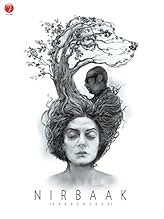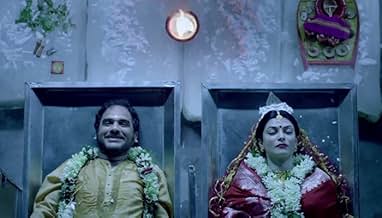Ajouter une intrigue dans votre langueNirbaak is a medley of four tales of silent love, involving one woman (Sushmita), three men (Anjan, Jishu and Ritwick), a tree and a dog.Nirbaak is a medley of four tales of silent love, involving one woman (Sushmita), three men (Anjan, Jishu and Ritwick), a tree and a dog.Nirbaak is a medley of four tales of silent love, involving one woman (Sushmita), three men (Anjan, Jishu and Ritwick), a tree and a dog.
Avis en vedette
Love that cannot speak, speaks the loudest in its speechlessness- and so to summarize the film in these words, and yet it would be a gross formulaic understanding of what it offers. The complexity of relationships are not just abounded within some emotions; it is also the inter-relation among other characters, a veritable saga of love, self indulgence, hatred and obsession that push forth (or regresses?) the destiny of each characters. The film revolves around the story of four people (Samson. Rahul, Mritunjaya and an unnamed woman played by Sushmita Sen) and three speechless entities (dog, a tree and a dead person); their stories weaved through clever interconnections, offering different and personal perspective to their story. Also, it is the woman in the story who becomes the pivotal connector to all other destinies (including that of her herself). The first story is of a narcissist (Samson), who in his utter loneliness and with the death of his wife is trying to pull himself out of his excessive self indulgence by reading personality development books. The second story is of a woman, who is not ready to leave her city, for it is in here she finds her inner solace. Later, her love is reciprocated by a tree which showers bounties upon her as she sits under the shade of it. The third story is that of a couple ( Rahul and the same woman) who have moved to a new apartment, is met by the man's sulky and jealous dog, who develops a disliking for the woman. The last story of a morgue technician ( Mritunjaya) who gets obsessed with one of the recent corpses under his watch. Each story moves in a circle, and ends with a neat closure, and begins again, like the rondure movement of the cycle of birth and death.
The film is a very insightful and ingenious take on the nature of love, and demonstrates that love is not only the property of those who can speak.
Film Nirbak has mainly four tales to tell . All of them are striking and their aesthetics is enchanting. All of them are worth reviewing more than once and all of them have their philosophical and ethical narratives on the sleeve. We have perhaps witnessed, in the second story, a contemporary deliberation of the Non- Anthropocentric ethical narrative of nature. And this is rare given that Bengali cinema although was imbibed once in philosophical creativity now only celebrates so called noir normalcy. Films that verge on creative and aesthetic variety that tends to be " non-mainstream " are easily sidelined by constant " mainstream " commercial –purpose –driven media propaganda.
Personification of the old tree and its relation with the lady and her lover is subtle. It requires vision on part of an artist to see what untold .It is requires talent to portray the same through visuals where dialogue plays its part not so much as it does in literature. The tree dreams of fantasies (Freudian ? ) of BDSM and ballerina with the lady . The tree whispers, although the lady can't hear them, the sound is carried by the wind it blows through the tree's branches. What a pity that the tree is immovable but all sorts of motion is played around it in a city that is still grappling with hegemonistic modernity through concrete, luxury cars and cell phones. The boyfriend is a typical smart gadget-money-honey-bunny-job happy self indulged metro dweller for whom life centers around possessions and materials and career and money and of course sex. Modern dreams everyone!! His career interests block way of his love expressions and he brings issues of adjustment, all of them that he sees through his materialistic looking glass. The lady is keen on the relationship but she is attached to the space around her – the space called Calcutta –her city, her moments of liberty and womanhood. Director does divine here to bring forth the tree for bestowing of a divine justice through sequences of funny scenes. Vision and the message is well expressed though. The tree is happy when finally it sees that its love, the lady, is accepted by her boyfriend not as a possession (like movable objects which he can carry from one city to another city catering to his career needs) but with humble mellowing gestures. The boyfriend relinquishes his possessive intentions for his lady love. The tree is now ready to relinquish its short lived affairs for the happiness it knows the lady will get now on. Nature thought about humans, we also think about nature, but do we allow our concerns to accept nature as it is, in its true totality or do we value nature just because our utilitarian intentions have logically prepared us to do so? Are we ready to accept that nature is intrinsically valuable and cautiously wiser than we are. Should we not go to nature , bow down before it with humble disposition deplete ourselves of conscious mental constructs of human superiority and accept that nature is not what we humans would want it to be for our own utilities but an existence intrinsically valuable in itself? Srijit has done great not only aesthetically but also philosophically. Even if this film is not accepted by our regular film critics or if movie watchers avoid this film sniffing at it with anti art -house rhetorical clichés (and by the way this is a new trend amongst our film critics in Bengal to label mega serial type dramas as Films) , still the purported philosophical and ethical quest that this film proposes is going to put this film on world standards.
Personification of the old tree and its relation with the lady and her lover is subtle. It requires vision on part of an artist to see what untold .It is requires talent to portray the same through visuals where dialogue plays its part not so much as it does in literature. The tree dreams of fantasies (Freudian ? ) of BDSM and ballerina with the lady . The tree whispers, although the lady can't hear them, the sound is carried by the wind it blows through the tree's branches. What a pity that the tree is immovable but all sorts of motion is played around it in a city that is still grappling with hegemonistic modernity through concrete, luxury cars and cell phones. The boyfriend is a typical smart gadget-money-honey-bunny-job happy self indulged metro dweller for whom life centers around possessions and materials and career and money and of course sex. Modern dreams everyone!! His career interests block way of his love expressions and he brings issues of adjustment, all of them that he sees through his materialistic looking glass. The lady is keen on the relationship but she is attached to the space around her – the space called Calcutta –her city, her moments of liberty and womanhood. Director does divine here to bring forth the tree for bestowing of a divine justice through sequences of funny scenes. Vision and the message is well expressed though. The tree is happy when finally it sees that its love, the lady, is accepted by her boyfriend not as a possession (like movable objects which he can carry from one city to another city catering to his career needs) but with humble mellowing gestures. The boyfriend relinquishes his possessive intentions for his lady love. The tree is now ready to relinquish its short lived affairs for the happiness it knows the lady will get now on. Nature thought about humans, we also think about nature, but do we allow our concerns to accept nature as it is, in its true totality or do we value nature just because our utilitarian intentions have logically prepared us to do so? Are we ready to accept that nature is intrinsically valuable and cautiously wiser than we are. Should we not go to nature , bow down before it with humble disposition deplete ourselves of conscious mental constructs of human superiority and accept that nature is not what we humans would want it to be for our own utilities but an existence intrinsically valuable in itself? Srijit has done great not only aesthetically but also philosophically. Even if this film is not accepted by our regular film critics or if movie watchers avoid this film sniffing at it with anti art -house rhetorical clichés (and by the way this is a new trend amongst our film critics in Bengal to label mega serial type dramas as Films) , still the purported philosophical and ethical quest that this film proposes is going to put this film on world standards.
Having watched 'Nirbaak' (Speechless) recently, a 2015 Bengali film directed by Srijit Mukherjee, I am in a bit of dilemma. Should I rate it as a good film, or a bad one? The initial thought that crossed my mind after the viewing of the film, which the director has dedicated to the master of surrealism- Salvador Dali, was that the film didn't make much sense to me. All the beautiful imagery and novel techniques employed in the depiction of Kolkata hitherto unseen could not force me to develop a liking for the film. Maybe the question you would pour forth is "why?". Well, for the kind of implausibility of the storyline - a women courted by three men, and hold your breath, a tree!!! Well, you can't really blame the tree for developing those amorous feelings when the lady is Susmita Sen, eh?
I have always had a soft corner for experimental films that break the conventional style, and Srijit masterfully breaks all cinematic idioms in this work and came up with a film that stretches your power of imagination and takes you on a journey rather unfamiliar on the Indian cinemascape. The film deserves a watch for the bold attempt to tell a different kind of romantic story using some brilliant cinematic moments. Anjan Dutt, Jishu Sengupta, and Ritwik Chakrabarty are the three male leads in the film, in which a dog too features in a prominent role.
Rating: 4 out of 5.
I have always had a soft corner for experimental films that break the conventional style, and Srijit masterfully breaks all cinematic idioms in this work and came up with a film that stretches your power of imagination and takes you on a journey rather unfamiliar on the Indian cinemascape. The film deserves a watch for the bold attempt to tell a different kind of romantic story using some brilliant cinematic moments. Anjan Dutt, Jishu Sengupta, and Ritwik Chakrabarty are the three male leads in the film, in which a dog too features in a prominent role.
Rating: 4 out of 5.
An extraordinary tale of four entities.international level concept being used to portray love .Love can be detrimental, can be soothing, can be conditional, can be fluke .A sense of separation is used to depicts nihilism .We failed as an audience. The old Srijit Mukherjee was a true auteur.
What a beautiful film! I don't know why it has such low reputation. It's not that deep or anything. Anybody who pays attention to cinema can get it. It's also visually a treat to the eyes. I enjoyed Anjan Dutta's acting and Sushmita Sen, oh god! She was like a goddes in here!
Bravo Srijit!
Bravo Srijit!
Le saviez-vous
- AnecdotesThis flim was dedicated to Father of Suralism Salvador Dali.
Meilleurs choix
Connectez-vous pour évaluer et surveiller les recommandations personnalisées
Détails
- Durée1 heure 47 minutes
- Couleur
- Rapport de forme
- 2.35 : 1
Contribuer à cette page
Suggérer une modification ou ajouter du contenu manquant

























